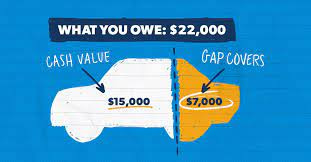Do you need GAP Insurance?

GAP (Guaranteed Asset Protection) insurance is designed to cover the “gap” between the actual cash value (ACV) of your vehicle and the remaining amount you owe on a loan or lease if your car is totaled or stolen. It’s a good idea to consider purchasing GAP insurance in certain situations:
- Financing or Leasing a New Vehicle: If you are financing or leasing a new car and made a small down payment (or none at all), the value of the vehicle may depreciate faster than you’re paying off the loan or lease. In such cases, the gap between the loan/lease balance and the vehicle’s value increases, making GAP insurance a prudent choice.
- High Depreciation Vehicles: Some vehicles tend to depreciate rapidly over time. If you’re purchasing a vehicle that is known for its fast depreciation, it’s wise to consider GAP insurance, especially if you have a long-term loan.
- Rolling Negative Equity: If you’re trading in a vehicle with negative equity (you owe more on the existing loan than the car is worth) and adding that amount to the new loan, you should consider GAP insurance to protect against potential financial loss in case of an accident.
- No Down Payment: If you’re not making a down payment or making a very small down payment on a financed vehicle, the initial depreciation may create a gap between the loan amount and the car’s value, making GAP insurance worth considering.
- Long-Term Loans: Longer loan terms mean it will take longer to build equity in the vehicle. As a result, the likelihood of being upside-down (owing more than the car’s value) for an extended period increases, making GAP insurance a valuable option.
- High-Interest Loans: If you have a high-interest loan, your loan balance might decrease more slowly than the vehicle’s value, leading to a gap. In this case, GAP insurance can be beneficial.
- Little to No Savings: If you don’t have enough savings to cover the potential gap in the event of a total loss, GAP insurance can provide peace of mind.
It’s important to note that not everyone needs GAP insurance. If you put a substantial down payment on your vehicle or if you paid for the car in full without financing, the risk of being upside-down is low, and GAP insurance might not be necessary.
Before purchasing GAP insurance, carefully review the terms and conditions, the cost of the coverage, and consider your financial situation and the risks involved. Also, check with your insurance provider or dealership to see if they offer GAP insurance and compare prices and coverage options.
If you would like us to review your Auto, Home or Business Insurance and provide you with a no-obligation quote, give us a call 585-663-2004.




